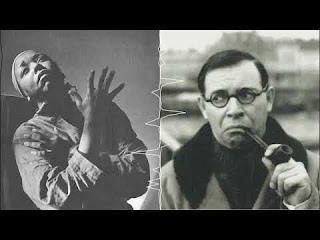It is Monday afternoon. I haven’t written anything for a few days, so I thought I’d just tell you what I have been up to. I have been reading Nausea by Jean Paul Sartre. It has been a bit of a struggle. I’m not saying it is a struggle because it is a bad or boring book. It is because my mind keeps drifting off on tangents when I try to understand what Sartre is saying. Also, I have to keep googling the meanings of words, such as autodidact or soliphism. The reason I ordered this book is as usual to do with Van Morrison. In a 2015 interview with Fintan O’Toole in the Irish Times Van was asked what books influenced him when he was young, and he said.” Well, three important books for me. A couple of them were given to me by a window cleaner: one was Dharma Bums, by Jack Kerouac; the other was Zen Buddhism by Christmas Humphreys. And the third one I found myself: Nausea, by Jean-Paul Sartre. So those were the three books that influenced me the most”. I thought I would read Nausea because I have written extensively in the past about the influence of Kerouac & the Beat writers on Van, likewise Christmas Humphreys. (I found Humphreys quite a strange character actually. Although he was probably one of Britain’s leading experts on Buddhism in the 20th century, he was also a lawyer and judge. It was he who prosecuted Ruth Ellis for the 1955 murder of David Blakely. She was the last woman to be hanged in Britain. He also secured the wrongful convictions of Timothy Evans and John Bentley. How Humphreys could be a practicing Buddhist while sending people to the gallows is beyond my understanding).
I’m getting off the point. What I wanted to talk about is the influence of Existentialism on Van Morrison. I wasn’t exactly sure what existentialism is, so I googled that as well. It said, ‘Existentialism is a philosophical theory that people are free agents who have control over their choices and actions. Existentialists believe that society should not restrict an individual's life or actions and that these restrictions inhibit free will and the development of that person's potential’.
Nausea was Sartre’s first novel published in 1938. It isn’t the first book by Sartre that I have read. Just after I finished college in 1974, I very much enjoyed reading The Age Of Reason which is the first book in Sartre’s Roads To Freedom trilogy. I also remember watching a highly acclaimed BBC TV series of Roads To Freedom around that time. The first time I ever heard Van’s song Tupelo Honey in the early 70s I thought he was referring to Sartre’s work. ‘You can't stop us on the road to freedom, You can't keep us 'cause our eyes can see, Men with insight, men in granite, Knights in armour bent on chivalry’. In his song The Meaning Of Loneliness on the What’s Wrong With This Picture album Van says, Nobody knows the existential dread, Of the things that go on inside someone else's head. He then goes on to say, well there's Sartre and Camus, Nietzsche and Hesse, If you dig deep enough, You gonna end up in distress, And no one escapes having to live life under duress, And no on escapes the meaning of loneliness.
 |
| Melancholia by Durer. |
The original title Sartre had planned for Nausea was Melancholia based on a painting of that name by Albrecht Dürer which as you know is also the title of a Van song on the Days Like This album. Whether Van knew that or not I don’t know. Anyway, I have written enough for one afternoon. I might write more when I finish the book. I want to end on a cheerful note because all this existential stuff can be a bit depressing.
In the book, the protagonist Antoine Roquentin seems to overcome the debilitating tawdriness of his everyday reality when he hears jazz music. There is one song he particularly likes called Some of these Days. I wanted to hear it, so looked on youtube. The best-known version was by Sophie Tucker, but Roquentin describes the singer as a negress. I think he must have heard the version by Ethel Waters. I like it and have shared it below if you want to hear it. I think Van would like this song because he recorded Miss Otis Regrets which was originally an Ethel Waters song. I must say I find existentialism hard to equate with a lot of Van’s very spiritual music, so I think his interest might have just been a phase he went through. He is quoted as saying that he isn’t into all that stuff anymore. If you know of any other links between Van and existentialism let me know.














No comments:
Post a Comment